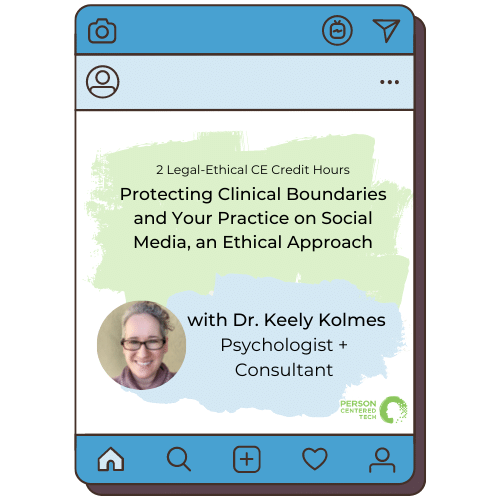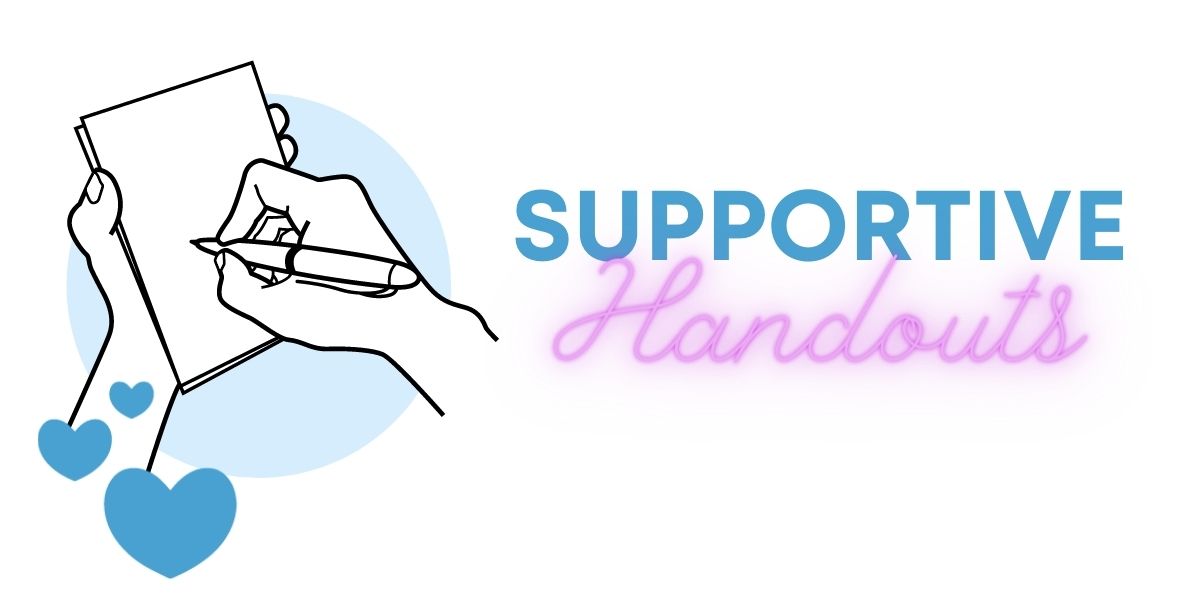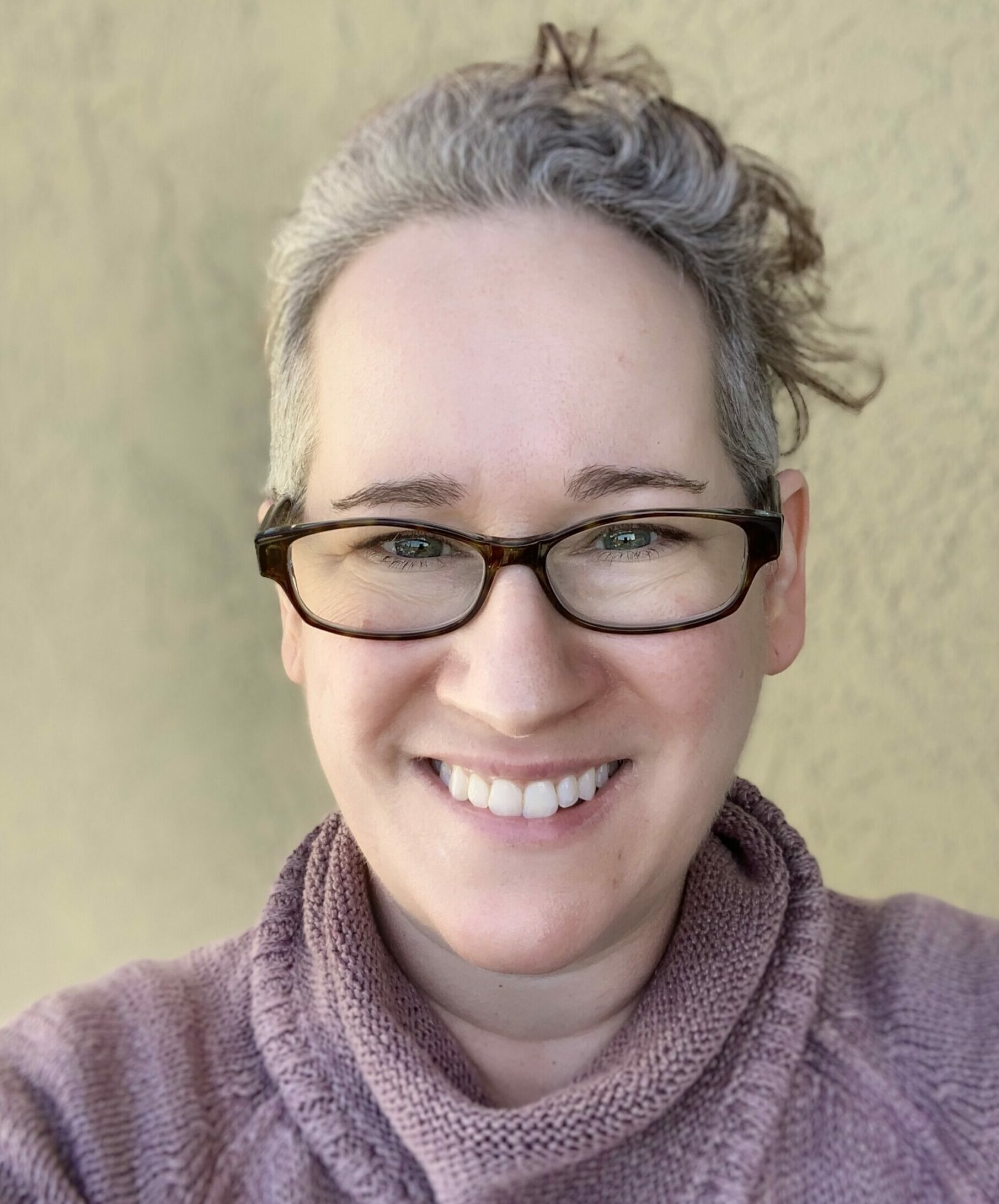2 Legal Ethical CE Credit Hours Event
Protecting Clinical Boundaries and Your Practice on Social Media, an Ethical Approach
On Demand Self Study
Join us as highly lauded social media ethics expert, Dr. Keely Kolmes, teaches about maintaining ethical professional boundaries in the highly porous world of social media.
2 legal ethical CE credit hours

with Dr. Keely Kolmes
Psychologist. Researcher. Consultant.

Everyone is on social media, love it or hate it.
Clinicians frequently use social media for everything from connecting with family to consulting with professional colleagues. Some clinicians even have a Web presence for non-therapy work, such as creative or performance personas, craft businesses, and much, much, more.
Join us as Dr. Kolmes addresses social media with an eye on their clinical research in digital ethics and practical knowledge on how to approach boundaries online.

Identifying Common Pitfalls
Identify the ethical challenges that may arise from engaging in activities on the Internet.

Online Boundaries
Describe the research that has been done on clients and psychotherapists finding one another’s information online.

Practical Guidance
Consider how a social media policy can address potential boundary issues with clients and be able to craft one so that these issues can be addressed as part of informed consent.

Plus Dr. Kolmes’s Social Media Policy Template
Course Details
The program is intended for Counselors, Clinical Social Workers, Marriage and Family Therapists, and Psychologists in both solo and group practice.
Title: Protecting Clinical Boundaries and Your Practice on Social Media, an Ethical Approach
Authors/Presenters: Keely Kolmes, PsyD
CE Length: 2 CE hours
Legal-Ethical CE Hours: 2 legal-ethical CE hours
Educational Objectives:
- Identify the ethical challenges that may arise from engaging in activities on the Internet.
- Describe the research that has been done on clients and psychotherapists finding one another’s information online.
- Consider how a social media policy can address potential boundary issues with clients and be able to craft one so that these issues can be addressed as part of informed consent.
Syllabus:
- Web Visibility
- Googling Ourselves
- Clients Searching for Us
- Google Alerts
- Personal vs Professional Activities Online
- Handling Misrepresentation
- Approaches to Online Presence
- Integrating an Online Identity
- Research on Extratherapeutic Online Encounters
- Therapists discovering client info online
- Why Clients search for their therapists
- Research on Consumer Reviews
- General Privacy Tips
- Status Update issues
- Exposure of your friend network
- Managing Personal Content
- Social Media Policy
- What are they?
- Why use one?
- What should it include?
- Ethics Codes and Social Media
- Applying Ethics Digitally
- General Priniciples of Codes
- Vignettes
- A variety of social media scenarios
- Q&A
Meet Our Presenters
Presented by Keely Kolmes, PsyD

Keely Kolmes, Psy.D. is a licensed psychologist in private practice in San Francisco, CA. They served for six years on the California Psychological Association’s Ethics Committee, ending their term as Chair. They also were elected twice as CPA’s Council Representative on APA’s Council. They are a Fellow of APA Division 42, Psychologists in Independent Practice. Dr. Kolmes writes, does research, and provides consultation and training on clinical and ethical issues related to social networking and technology. Their Private Practice Social Media Policy has been cited and adapted internationally. They have published a New York Times Op-Ed on the challenge of consumer reviews of mental health services. They have also been quoted in The Washington Post, Forbes.com, HuffPost Live, and BBC News on issues related to the Internet, ethics, and clinical practice.
Additional Information
Resources & Citations
-
- American Association for Marriage and Family Therapy (2015). Code of Ethics. Retrieved from https://www.aamft.org/Legal_Ethics/Code_of_Ethics.aspx
- American Counseling Association (2014). ACA Code of Ethics. Retrieved from https://www.counseling.org/resources/aca-code-of-ethics.pdf
- American Psychological Association. (2017). Ethical Principles of Psychologists and Code of Conduct. Retrieved from https://www.apa.org/ethics/code/
- Baier, A (2018). The Ethical Implications of Social Media: Issues and Recommendations for Clinical Practice. Ethics & Behavior, 29(5)341-351.
- Barnett, Jeffrey E. & Kolmes, Keely. (2016). The practice of tele-mental health: Ethical, legal, and clinical issues for practitioners. Practice Innovations, Vol 1(1), 53-66.
- Barnett, J. E. (2019). The ethical practice of psychotherapy: Clearly within our reach. Psychotherapy, 56(4), 431-440.
- Behnke, Stephen, Ethics in the age of the Internet. APA Monitor on Psychology, July/August 2008, 74-75.
- Blue, V. (2014). Chapter 7: People search websites. In The smart girl’s guide to privacy. (pp. 84-96). Digita Publications Privacy
- Cole, A. (2017). Patient-targeted Googling and psychiatry: A brief review and recommendations in practice. The American Journal of Psychiatry. 11(5). 7-9.
- Dike, C.C., Candilis, P, Kocsis, B., Sidhu, N., & Recupero, P. (2019). Ethical considerations regarding internet searches for patient information. Psychiatric Services. 70(4) 324-328.
- DiLillo, D., & Gale, E. B. (2011). To Google or not to Google: Graduate students’ use of the Internet to access personal information about clients. Training and Education in Professional Psychology, Vol 5(3), 160-166.
- Donner, M., (2007). The Ethical Use of the Listserv: Privacy and Professional Conduct, The California Psychologist, November/December 2007, 22.
- Duncan-Daston, R., Hunter-Sloan, M., & Fullmer, E. (2013). Considering the ethical implications of social media in social work education. Ethics and Information Technology, 15(1), 35–43.
- Fange, L., Mishna, F., Zhang, V. F., Van Wert, M., & Bogo, M. (2014). Social media and social work education: Understanding and dealing with the new digital world. Social Work in Health Care, 53, 800–814.
- Gershenogoren, L. (2019). Patient-targeted googling and psychiatric professionals. The International Journal of Psychiatry in Medicine. 54(2), 133-139.
- Gupta K., Sinha A., Bhola P. (2016). Intersections Between Ethics and Technology: Online Client–Therapist Interactions. In: Bhola P., Raguram A. (eds) Ethical Issues in Counselling and Psychotherapy Practice. Springer, Singapore
- Hobbs, K.W., et al. (2018). Incorporating information from electronic and social media into psychiatric and psychotherapeutic patient care: Survey among clinicians. Medicine 2.0: Social Media, Open, Participatory, Collaborative Medicine. Retrieved from https://www.jmir.org/2019/7/e13218/
- Kaslow, Florence W.; Patterson, Terence; Gottlieb, Michael. (2011). Ethical dilemmas in psychologists accessing Internet data: Is it justified? Professional Psychology: Research and Practice, Vol 42(2), 105-112.
- Kolmes, K. (2020). Updated private practice social media policy.
- Kolmes, K. (2012). Social Media in the Future of Professional Psychology. Professional Psychology: Research and Practice, Vol 43(6), 606-612
- Kolmes, K. (2016). Digital and Social Media Multiple Relationships on the Internet. In Ofer Zur (Ed.) Multiple Relationships in Psychotherapy and Counseling: Unavoidable, Mandatory, and Common Relations Between Therapists and Clients. Taylor & Francis.
- Kolmes, K. & Taube, D. O., (2014). Seeking and Finding Our Clients on the Internet: Boundary Considerations in Cyberspace. Professional Psychology: Research and Practice, Vol 45(1), Feb 2014, 3-10. doi: 10.1037/a0029958
- Kolmes, K., & Taube, D. O. (2016). Client discovery of psychotherapist personal information online. Professional Psychology: Research and Practice, Vol 47(2), 147-154
- Kolmes, K., & Taube, D.O. (2019). Yelped: Psychotherapy in the time of online consumer reviews. Practice Innovations, Vol 4(4), 205-213.
- Lannin, D. G., & Scott, N. A. (2013). Social Networking Ethics: Developing Best Practices for the New Small World. Professional Psychology: Research and Practice, Vol 44(3), 135-141
- Lehavot, K., Barnett, J., & Powers, D. (2010). Psychotherapy, professional relationships, and ethical considerations in the MySpace generation. Professional Psychology: Research and Practice. Vol 41(2), 160-166.
- McPherson, A. S. (2019). Client-initiated disclosure of psychotherapists’ sexual orientation: A narrative inquiry. Counseling & Psychotherapy Research. 20(2), 365-377.
- National Association of Social Workers (2017). Code of Ethics. Retrieved from https://www.socialworkers.org/About/Ethics/Code-of-Ethics/Code-of-Ethics-English
- Reamer, F. G. (2015). Clinical social work in a digital environment: Ethical and risk- management challenges. Clinical Social Work Journal 43, 120–32.
- Reamer, F. G. (2018). Ethical Standards for Social Workers’ Use of Technology: Emerging Consensus. Journal of Social Work Values and Ethics. 15/2.
- Sabin, J.E., Harland, J.C. Professional Ethics for Digital Age Psychiatry: Boundaries, Privacy, and Communication. Current Psychiatry Reports 19, 55 (2017).
- Tutelman, P. R., Dol, J., Tougas, M. E., & Chambers, C. T. (2018). Navigating your social media presence: Opportunities and challenges. Clinical Practice in Pediatric Psychology, 6(3), 289–298.
- Zur, O. (2012). TelePsychology or TeleMentalHealth in the digital age: The future is here. The California Psychologist 45, 13–15.
- Zur O. & Donner, M.B. (2009, January/February). The Google Factor: Therapists’ Transparency in the Era of Google and MySpace. The California Psychologist, 23-24.
Accuracy, Utility, and Risks Statement: None.
Conflicts of Interest: None reported. Dr. Kolmes may make mention of Getting Better, their post-treatment client satisfaction survey, and their updated social media policy. They also have co-authored a book called The Paper Office for the Digital Age. Obviously, purchase of any of these items would incur a financial benefit to Dr. Kolmes.
Commercial Support: Person Centered Tech Inc. is sponsoring this event and will give a brief commercial presentation during the break.
